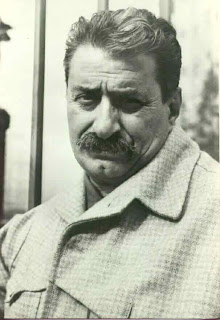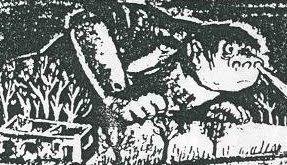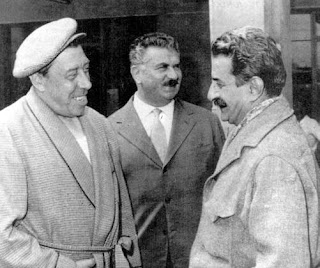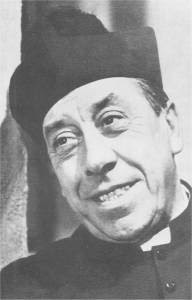As some of you WDTPRSers might remember, I am a fan of the Don Camillo books and movies.
So I was delighted to see that our friends at Rorate posted a really nice entry on the author Giovanni Guareschi. I didn’t know it, but this is Guareschi’s centenary
I just decided to port over here the entry at Rorate, but be sure to click over there and visit them, and tell ’em Fr. Z sent you. They do good job in a good cause! This was a great entry with very good introductory observations about faith and reason, etc.
My emphases.
‘I will not die even if they kill me’
 One of the most significant Italian writers of the 20th Century – and certainly one of the most underrated – was Giovanni Guareschi, better known as "Giovannino" Guareschi, born on May 1, 1908, 100 years ago.
One of the most significant Italian writers of the 20th Century – and certainly one of the most underrated – was Giovanni Guareschi, better known as "Giovannino" Guareschi, born on May 1, 1908, 100 years ago.Few contemporary European writers had so much authentic Catholic sensibility embedded in their works as Guareschi, whose masterpiece was the series of works, the Mondo Piccolo (Little World), in which the great struggle of his and of our age – the war between Faith and Reason (Logos), on one side, and Socialist barbarianism and relativism, of either "left" or "right", on the other, with many indifferent or lukewarm spectators in the middle – played itself out in a small village in the Italian countryside.
Don Camillo Tarocci, a parish priest in a village of Emilia, was the literary expression of that Church which would not yield, the Church of Pius IX, of Pius X, of Pius XI, of Pius XII – but also the Church of Humanae Vitae, of Evangelium Vitae, of Summorum Pontificum. A Church which is the ardent bearer of all the goods of Civilization, and Reason, and Morals, both in the real world, and in the Little World of Don Camillo.
Giovannino Guareschi, a proud son of the Church, described himself and his world in his introduction to the seventh edition of "Mondo Piccolo: Don Camillo", first released in 1948:
_______________________________
My life began on the 1st of May 1908, and between one thing and another, it still goes on.When I was born my mother had been teaching in the elementary school for nine years and she continued to teach until the end of 1949. In recognition of her work, the parish priest of the village presented her with an alarm clock in the name of all the people, and after fifty years of teaching in schools where there was no electric light or water but, in compensation, an abundant supply of cockroaches, flies, and mosquitoes, my mother now passes her time waiting for the government to consider her request for a pension and listening to the tick-tock of the alarm clock given her by the village.
At the time when I was born, my father was interested in all kinds of machines, from harvesters to gramophones, and he possessed an enormous moustache, very similar to the one I wear under my nose. He still has the splendid moustache, but for some time he has not been interested in much of anything, and he passes his time reading the newspapers. He also reads what I write, but he does not like my way of writing and thinking.
…
For reasons entirely beyond my control, the war broke out and one day in 1942 I went on a terrible bout of drinking because my brother was lost in Russia and I couldn’t find anything about him. That night I went up and down the streets of Milan shouting things which filled several sheets of legal-sized paper – as I found out the next day when I was arrested by the political police. Then a lot of people worried about me and they finally got me released. However, the political police wanted me out of circulation and so had me called into the army, and on the 9th of September 1943, with the fall of Fascism, I was taken prisoner again, this time at Alessandria, in Northern Italy, by the Germans. Since I did not want to work for the Germans, I was sent to a Polish concentration camp. I was in various concentration camps until April 1945, when my camp was taken over by the English and after five months I was sent back to Italy.The period I spent in prison was the most intensely active of my life. In fact I had to do everything to stay alive and succeeded almost completely by dedicating myself to a precise programme which is summarized in my slogan ‘I will not die even if they kill me’.
…
A few months ago the leader of the Italian Communists, Mr. Palmiro Togliatti, made a speech in which he lost his temper and called the Milanese journalist who invented the character with the triple nostrils ‘a triple idiot’. The threefold idiot is me and this was for me the most prized recognition of my work as a political journalist. The man with three nostrils is now famous in Italy, and it was I who created him. I must admit that I am proud because to succeed in characterizing a Communist with a stroke of the pen (that is, putting under the nose three, instead of two, nostrils) is not a bad idea, and it worked very well.And why should I be modest? The other things that I wrote and drew during the days before the election [of 1948, in which the Italian Communist Party was unexpectedly defeated] also worked very well; to prove it I have in my attic a sack full of newspaper clippings which malign me; whoever wants to know more can come and read them.
The stories in The Little World of Don Camillo were very successful in Italy, and this book, which collects the first series of these stories, is already in its seventh edition. Many people people have written long articles on The Little World of Don Camillo and many people have written me letters about this or that story, and so now I am a little confused, and I would find myself rather embarrassed if I had to make any judgement of The Little World of Don Camillo. The background of these stories is my home, Parma, the Emilian Plain along the Po where political passion often reaches a disturbing intensity, and yet these people are attractive and hospitable and generous and have a highly developed sense of humor. It must be the sun, a terrible sun which beats on their brains during the summer, or perhaps it is the fog, a heavy fog which oppresses them during the winter.The people in these stories are true to life and the stories are so true that more that once, after I had written a story, the thing actually happened and one read it in the news.
In fact the truth surpasses the imagination. I once wrote a story about the Com
munist, Peppone, who was annoyed during a political meeting by an airplane which threw down pamphlets of the opposition. Peppone took up a machine-gun, but he could not bring himself to fire on the plane. When I wrote this I said to myself, ‘This is too fantastic.’ Some months later, at Spilimbergo [Northern Italy], not only did the Communists fire on an airplane that distributed anti-Communist pamphlets, but they shot it down.
I have nothing more to say about The Little World of Don Camillo. You can’t expect that, after a poor fellow has written a book, he should also understand it.
I am 5 feet 10 inches high and I have written eight books in all. I have also done a movie which is called People Like This, now being distributed throughout Italy. Many people like the movie; others do not like it. As far as I am concerned, the movie leaves me indifferent. Many things in life me indifferent now, but that is not my fault. It is the fault of the war. The war destroyed a lot of things we had within us. We have seen too many dead and too many living. In addition to 5 feet 10 inches, I have all my hair.






































Don Camillo and Peppone…such true characters! And just like in real life, sometimes Peppone would win, sometimes Don Camillo would win…delightful reading…Thanks for bringing Guareschi to mind!
I discovered Don Camillo and the mayor Peppone years and years ago by chance. I am a voracious reader with a solid memory and thus found it difficult to reread a book once it had been read. But the Little World books were so delightful that I would periodically take down my copy from the bookshelf and reread the stories. always delighted in the various adventures.
Yes thanks for reminding us of these books and their author
Thank you also for reminding me of the comic actor Fernandel who played Don Camillo and who is shown above.
The Don Camillo stories are indeed splendid. A Catholicism that possibly can never be recreated, because it depends on being generally accepted as a central part of society, even by its oppoments.
The obsessed (or curious) might like the following website, which contains dozens of full-text stories (warning – lots of pop-ups).
http://members.tripod.com/~vajrang/littleworld/stories.html
Many years ago SBS in Australia showed the Don Camillo movie with Fernandel; I enjoyed it immensely. Sadly though as Richard said A Catholicism that possibly can never be recreated, because it depends on being generally accepted as a central part of society, even by its oppoments. Also on SBS I have watched a Dutch language series about a Catholic priest in a small village. It must have been old even though it was in colour because the priest was Faithful and the Church wasn\’t villified.
Many years ago SBS in Australia showed the Don Camillo movie with Fernandel; I enjoyed it immensely. Sadly though as Richard said A Catholicism that possibly can never be recreated, because it depends on being generally accepted as a central part of society, even by its oppoments. Also on SBS I have watched a Dutch language series about a Catholic priest in a small village. It must have been old even though it was in colour because the priest was Faithful and the Church wasn’t villified.
Thanks Father! I discovered (and devoured) the Don Camillo series quite by accident when I was coming into the Church in Bombay. I think they should be much more widely read!
Guareschi’s views on Vatican II are, I think, quite germane. I’ve linked to a blog post that delves into this, based on the last Don Camillo book, “Don Camillo and the Hell’s Angels.”
Ah, memories!
Back in 1950s Ireland in Minor Seminary, silence was observed during lunch and dinner in the refectory. Each day one of the students read while we ate. One of the staples was: “Christian Politeness and Counsels for Youth” by the Irish Christian Brothers.
This vademecum gave one instructions on everything from, how to properly set a table for dinner, which fork to use and when, to how to address a letter to a bishop, an archbishop or a Peer of the Realm.
In addition to this ‘heavy reading’ there was some lighter fare – and it consisted of Don Camillo novels!
I haven’t been reminded of Don Camillo and Peppone since then, but I am now motivated to renew their acquaintance…!
GOR, that’s splendid; I love the thought that you were being taught how to address a Peer of the Realm – after Ireland had declared itself a Republic!
Yes Richard T, that seemed a little odd to us at the time. But remember, we were still just a very young Republic (since 1948) at the time, so there were still many vestiges of the Empire about…